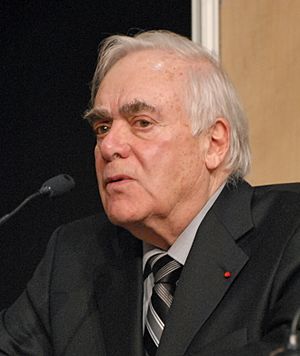Marcel Masse facts for kids
Quick facts for kids
The Honourable
Marcel Masse
|
|
|---|---|

Masse in 2012
|
|
| Member of the Canadian Parliament for Frontenac |
|
| In office September 4, 1984 – October 24, 1993 |
|
| Preceded by | Léopold Corriveau |
| Succeeded by | Jean-Guy Chrétien |
| Member of the National Assembly of Quebec for Montcalm | |
| In office June 5, 1966 – October 28, 1973 |
|
| Preceded by | Gérard Martin |
| Succeeded by | District merged with Joliette |
| Personal details | |
| Born | May 27, 1936 Saint-Jean-de-Matha, Quebec, Canada |
| Died | August 25, 2014 (aged 78) Sainte-Agathe-des-Monts, Quebec, Canada |
| Political party | Progressive Conservative Union Nationale (until 1971) |
Marcel Masse was an important Canadian politician. He was born on May 27, 1936, and passed away on August 25, 2014. He served in different government roles. These included being a member of the Quebec legislature, a member of the Canadian Parliament, and a minister in the Canadian government.
Contents
Marcel Masse: A Canadian Politician
Early Life and Education
Marcel Masse was born in Saint-Jean-de-Matha, Quebec. He studied at the Université de Montréal. Later, he continued his studies in Paris, France. Before becoming a politician, he worked as a high school teacher. He taught in Joliette, Quebec, from 1962 to 1966.
Starting in Quebec Politics
In 1966, Marcel Masse was elected to the Quebec National Assembly. This is Quebec's main law-making body. He represented the area called Montcalm. He was a member of the Union Nationale party. This was a conservative political party in Quebec.
He served as a minister in the governments of two Quebec premiers. These were Daniel Johnson and Jean-Jacques Bertrand. He was re-elected in 1970. In 1971, he tried to become the leader of his party but did not win. After that, he left the Union Nationale party. He served the rest of his term as an independent member.
Moving to Federal Politics
After his time in Quebec politics, Marcel Masse decided to try for a seat in the House of Commons of Canada. This is part of Canada's federal Parliament. He ran as a candidate for the Progressive Conservative Party of Canada. He ran in 1974 and 1980 but was not elected.
Finally, in the 1984 election, he won. He became a Member of Parliament for the area of Frontenac. This election brought Brian Mulroney and the Progressive Conservative party to power.
Important Roles as Minister
After the 1984 election, Prime Minister Mulroney chose Marcel Masse to be a minister. He became the Minister of Communications. This role involved looking after things like broadcasting and cultural policies.
In 1985, he briefly stepped down from his role. This happened during an investigation about his election campaign spending. However, he was cleared of any wrongdoing. He then returned to his position as Minister of Communications.
As Communications Minister, he worked on Canada's cultural policy. He wanted to protect Canada's culture during talks about a Canada–United States Free Trade Agreement. Later, in 1986, he became the Minister of Energy. He returned to the Communications role after the 1988 election.
In 1991, Masse became the Minister of National Defence. This role involves overseeing Canada's military. He left the government in January 1993. Many ministers who were not running in the next election also left at that time.
Life After Politics
After leaving federal politics, Marcel Masse continued to be active. He was known as a moderate Quebec nationalist. This means he supported Quebec having more control over its own affairs. He held several positions under the governments of Jacques Parizeau and Lucien Bouchard. These leaders were from the Parti Québécois party.
In 1995, he led a committee that held public meetings. These meetings discussed Quebec independence. This was before the 1995 Quebec referendum on sovereignty. He also served as Quebec's delegate-general in France from 1996 to 1997. This role is like being an ambassador for Quebec in France.
His Legacy and Awards
Marcel Masse received several important awards for his work.
- In 1995, he was made an Officer of the National Order of Quebec.
- In 1989, he became a Commander of the Order of La Pléiade.
- In 1999, he was made an Officer of the Legion of Honour, a high French award.
- He also became a Commander of the Ordre des Palmes Académiques.
Passing Away
Marcel Masse passed away on August 25, 2014.
 | Valerie Thomas |
 | Frederick McKinley Jones |
 | George Edward Alcorn Jr. |
 | Thomas Mensah |

